What answer are you looking for? That's the first place to start.
0 Comments
 What are the pillars of our society? Those who make decisions on our behalf, those who enforce those decisions and those who report them to us: Government Churches The military The media They are all institutions whose existences are based on beliefs they do not accept any dissension from. Government – we are legitimate and all of our actions are legitimate Churches – our dogma is correct and you will be punished in the next life if you disobey The military – our wars are justified and you are not patriotic if you say otherwise The media – what we say is true, we hide nothing important and if you disagree, you are a nut. The institutions control public discussion by labeling thoughts that would harm their existence. The following questions will never be answered by any of these pillars: Government – What is national security and what types of information are really hidden to the public for this reason? Churches – Can you prove that the leader of your religion really existed? The military – How many soldiers would you recruit if you told them the truth about why we were sending them to war? The media – How often are you pressured into dropping stories and who pressures you? To get these questions answered, we need another actor to join the debate. Many fear the institutions and their enormous power and do not ask why our society functions as it does. But we need the questions answered. Almost every debate, whether about something like guns (especially in light of recent reported shootings in the national news) or butter (like the perpetual debate of how much money to devote to the military) starts off with at least one of the false beliefs stated above. In short, the debate gets it wrong IN THE FIRST PLACE. Be a part of a public that reasonably questions what we hear. Disregard those who state beliefs but do not back them up or who refuse to answer your questions. This is how we collectively will get these questions answered. Then we can discuss the details. 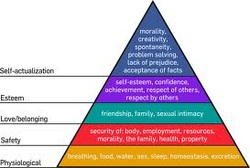 Many people laugh when I suggest that people connected to the government lied to the public about the events of 9/11. But when I say politicians lie, or members of the Supreme Court lie, or that public officials lie about other matters, the same people nod their heads and agree enthusiastically. Why is that? It has to do with needs. If one determines that they need something, they tend to hold on to it more tightly than something they could do without. This attitude is simple human nature. According to Maslow’s Hierarchy of Needs (see picture), a person’s first set of needs are the most basic: we all need to breathe, drink water, eat food, etc. If we are dependent (or believe we are dependent) upon someone else to provide these necessities, we would not likely question that person or antagonize them. We could be saying goodbye to our lives! Once a person achieves this first set of needs, this theory tells us, they are able to handle the next set, which is about the security of: one’s person, employment, health, etc. If one does not feel secure about themselves and about their position in society, they will not be able to move up the “ladder” of the hierarchy and make friends or feel self-confidence. “Rocking the boat” and questioning those who provide security, such as agents of our government, jeopardizes one’s ability to become a confident and social person. It may not be the same as being deprived of water, but one who openly doubts those charged with providing security risks social suicide! No wonder a majority of people still trust our government with the responsibility of protecting us from attack, despite overwhelming evidence that the events of 9/11 were a hoax! It is far safer to “settle” for accusing politicians of lying and cheating because there is no fear of retaliation or alienation for espousing these views. Yes, we all understand the advantage of safety: one does not have to lift a finger. Imagine the possibility of afterlife. This idea goes beyond one’s security on the temporary home of Planet Earth. It goes to eternal life. Imagine a deity who records your every thought and action. Imagine your destination after life going favorably in one direction and horribly in another direction. Imagine this deity having control over which way you go. Many of those who are willing to speak out against the actions of those charged with running our government are unwilling to speak up about certain religions that threaten eternal insecurity to those that question the deity. There is something missing in the Maslow’s theory. Somewhere after we get our water and our food, we need to grasp the right to ask questions and to obtain answers. The idea of either trusting our leaders blindly to protect us or to face alienation is not sufficient for any of us to function in a world of deception and lies. That’s my theory. We need choices that reflect our needs, not our fears.  There will always be a gap between what we expect and what we get. We expect the truth but those who know it may not have any reason to tell us and good reason not to. We expect a peaceful environment around us but it only takes one person to shake it. We expect that others will respect our rights but for some, ignoring rights is the way they achieve what they want. About the only things that cannot be taken from us are our own thoughts and feelings. To expect anything beyond that is to feed our disappointments. In the words of Buddha, when you cease expecting, you have all things.  When the revolution came, no one recognized it. "The media's lying to us? Yeah, right. You people should go to jail." Those who could see found their vision had no light, their voice had no audience. They had nowhere to go. The few true revolutionaries looked within for freedom, for genuine solutions to problems and for the truth. It was a movement with no sound or fury, a concoction of like-minded people who decided the box had nothing to offer them. They would meet every so often to provide comfort to one another. The rest of society simply ignored them. They knew what was best for themselves and for others. Very soon they outlawed questions by refusing to answer them. This is how a lie became the truth. The revolutionaries are nothing more than a memory somewhere deep in the archives of the Town that Time Forgot. No one will ever ask about the time capsule of the revolutionaries and their ideas. It's not that they don't care. They just don't know how. Now they don't even recognize themselves. Who says you need a gun to dictate to the masses? Some just dictate themselves. 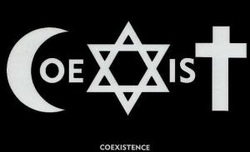 There was a time in my life I especially remember that in which I should have said something. I was in high school and in my English class, one of my classmates (I will call him Tex) made comments about his Christian beliefs on an almost daily basis. We were in a public school and most of the students had the patience to listen to what came off as religious dogmatism. Others in the class hounded him, told him to shut up and jeered whenever he would start to say something. I sat there in an emotional straightjacket until one day, after class, I started crying. I felt bad for the fact he was being picked on but did not know quite what to say in class. It took me years, but now I have constructed an imaginary dialogue which I could have started to get the class to understand Tex’s background: Me: Tex, where are you from? Tex: Texas Me: Are you Baptist or Methodist? (Sorry for the stereotype, but it is close to the truth) Tex: Baptist Me: Did you attend church every Sunday? Tex: Yes Me: Did everyone else in your neighborhood go? Tex: Yes Me: Did anyone ever challenge the doctrines of the church? Tex: I never heard of anyone doing that. With my background of having spent several summers in Texas visiting my grandparents, I had an understanding of how most people raised in the South (and especially those who still live there) think about religious and political matters. I could have told my classmates that people in the South devoutly believe as they do just as much as non-religious people believe. Attacking a person’s beliefs will get us nowhere. It is better to simply ask a few questions and create a dialogue. No one should be made to feel left out. We realize at some point in our formative years certain truths. Only one kid is the smartest kid in the class and it is not us. The person we have a crush on may not have a crush on us. We get privileges like driving at roughly the same rate that we get responsibilities (like paying for gasoline or insurance).
The harder truths welcome us to adulthood. We have to find a way to pay the bills, to work with bosses and co-workers who see the world differently than we do and some of us get interesting neighbors. These are the truths that we handle. We go to work, we play by the rules of society and we deal with the consequences when we do not. But some truths make us feel uncomfortable. These truths typically come to our attention when the rules are murky and we have no one to ask for advice. Take, for example, a situation where one is a witness to a crime. The rules of society urge us to report the activity to the police, and I am sure most people do so. But what if the police are involved in the crime, or one’s employer? The consequences of acting approach the consequences of not doing so. Let’s say the witness to the crime is an advisor to a candidate for high office. And the witness sees the candidate involved in illegal campaign contributions and falsifying campaign finance reports. The witness now has several factors to consider: Do I tell anyone? Who would I tell? How badly will I be harming the campaign (that the witness otherwise believes in)? Whom could I ask for advice who won’t tell the candidate? Can I tell an authority this information anonymously? If my name is given to the candidate by the person I tell, will I be fired? Will I then be able to get another job? The truth of what happened here is indisputable. The truth of what to do about it is far more complex. Some accounts of the truth depend upon the teller. People who have much to lose typically show no interest in giving the whole story about what they know. A man goes to a workshop entitled “Finding the Truth.” He listens to the lecturer drone on and on about a number of different topics. Afterward, he decides to approach the lecturer and ask him, “What is the truth?” “The truth reveals itself every day.” Puzzled by this response, the man asked others attending the class what the truth was. They replied that “the truth is as the professor says.” Frustrated, he went to the cashier’s booth to ask for his money back. The cashier looked at him and asked why. “I didn’t get my money’s worth about finding the truth!” “The truth is that if you walk away now, you will lose your opportunity to join the elite club.” The lecturer, the other attendees and the cashier all told the truth, but simply failed to mention one fact to the man: they were involved in a pyramid scheme. So some truths do not dare speak their name. And some questions with certain individuals will be completely ineffective. For example, if you ask a devout Christian whether the Resurrection took place, do you really think their answer will be anything but affirmative? Getting the truth about any topic of interest rarely involves one question. The witness to the campaign crime cannot determine the best approach without going through a series of questions like the one described. And some questions are misplaced. The man who attended the lecture could have asked the professor what the lecture had to do with finding the truth. And one could ask a devout Christian why they believe in the Resurrection. Setting the truth free involves going through the circumstances around it and then picking a set of questions that pinpoint what one needs to know. |
AuthorDean Hartwell keeps pursuing the truth about those who govern us. Categories
All
Archives
May 2020
|
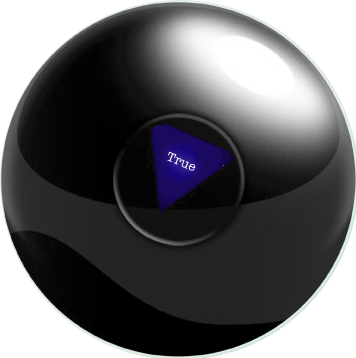
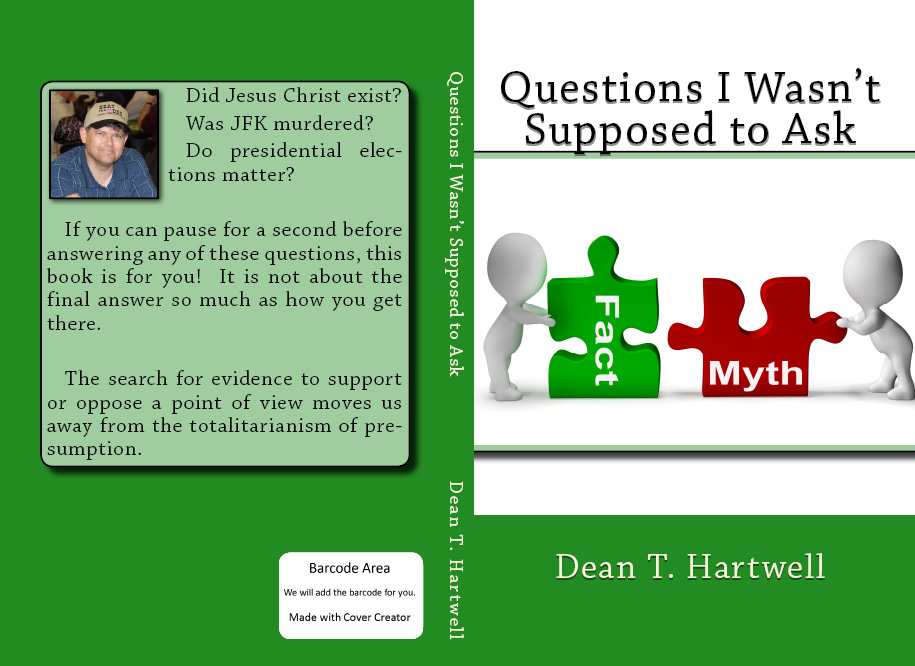
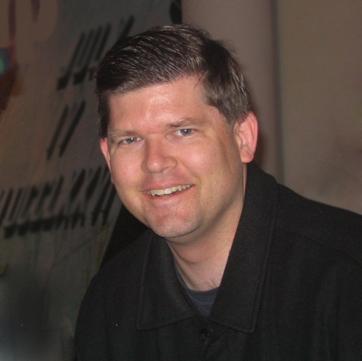
 RSS Feed
RSS Feed
